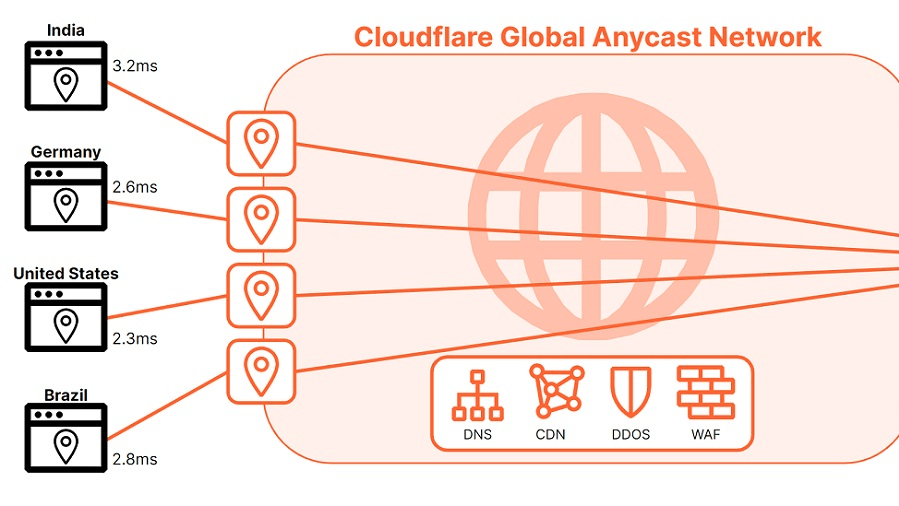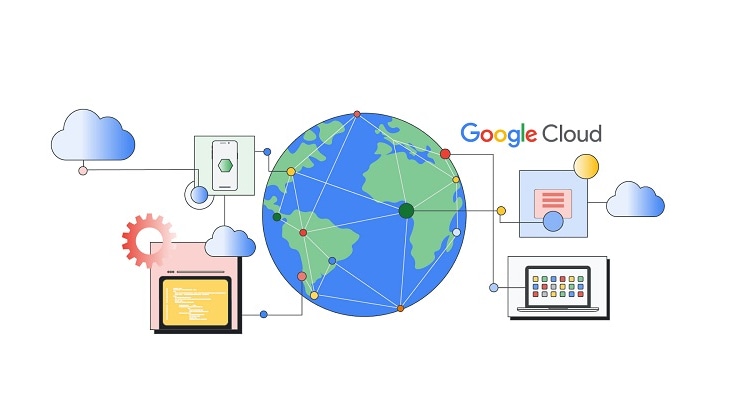Cloudflare vs Google DNS: Which tool is best for your domain?
- 01Cloudflare vs Google DNS: overview
- 02What's the difference between Cloudflare and Google DNS?
- 03Cloudflare pros and cons
- 04Google DNS pros and cons
- 05Cloudflare compared to Google DNS
- 06Google DNS compared to Cloudflare
- 07Features comparison
- 08Cloudflare vs Google DNS: Which is the best for your business?
- 09Promotions on Security software
- 10Alternatives to Cloudflare & Google DNS
Save up to $250,000 on Cloudflare
Save up to $250,000 on Cloudflare
Navigating the world of DNS services is crucial for ensuring fast and secure internet connectivity. As integral components of the internet infrastructure, DNS providers like Cloudflare and Google DNS are at the forefront, offering robust solutions for routing users to their online destinations efficiently. Choosing the right DNS can be overwhelming with the wealth of options available.
To assist you in this choice, we’ve meticulously compared Cloudflare and Google DNS, two titans in the DNS space. We’ll explore their features, performance, privacy policies, and user experiences. By the end of this exploration, you will have a clear understanding of how each provider can support your specific internet needs, whether you’re a business looking for reliability and advanced analytics or an individual prioritizing privacy and speed. Let’s unpack the details!
Cloudflare vs Google DNS: overview
Cloudflare and Google DNS are two powerhouses in the domain of DNS services, pivotal for optimizing internet performance and security.
Cloudflare prides itself on its security-first approach, offering robust protection against DDoS attacks, data leaks, and other vulnerabilities. It's designed for individuals and businesses alike, aiming to enhance internet performance and reduce latency with its expansive network of data centers around the globe. Google DNS, on the other hand, brings the reliability and speed synonymous with the Google brand to the DNS landscape. It focuses on providing a fast and secure connection, with an emphasis on improving the end-user experience through its globally distributed infrastructure.
Let's delve into the nuances of Cloudflare versus Google DNS to help you determine which DNS provider aligns best with your internet needs, whether you're looking to bolster your online defenses or accelerate your browsing experience.
What's the difference between Cloudflare and Google DNS?


Cloudflare is a company that specializes in improving the performance, security, and reliability of anything connected to the internet. They have quickly become one of the leading players in the field of security and performance, boasting a network of servers spread across the globe. What sets Cloudflare apart is its commitment to user privacy and security, ensuring that end-user data remains protected. In fact, Cloudflare dominates a portion of the DNS market with its fast DNS services. For enhanced browsing speed and a seamless internet experience, Cloudflare utilizes one of the DNS resolvers known as the 1.1.1.1 resolver.
On the other hand, Google offers its free global domain name system resolution service, known as Google DNS. While it ranks among one of the best public DNS services, it isn't specifically designed to handle high-volume input/output or perform tasks such as caching and load balancing between servers. However, Google DNS does provide DNS over TLS (DoS) protocol for encrypting and securing domain name system queries; this is similar to how HTTP encrypts and authenticates communications for security purposes. By leveraging their infrastructure, Google prioritizes more secure web connections through their DNS service. However, it does not provide the extent of privacy-focused features that Cloudflare offers.
Cloudflare is definitely a known player in the world of DNS hosting, often considered to be one of the most recognized DNS service providers globally. Apart from offering CDN services to clients all over the world, Cloudflare primarily focuses on providing content delivery networks that enable seamless delivery of internet content on a global scale. On the other hand, Google Cloud DNS falls under the category of DNS management, with its main goal being to enhance more reliable web connections across the domain name system. It can be compared to a telephone directory for the internet, playing a role in ensuring smooth web browsing experiences. Therefore, the choice between these two will depend on your needs as well as the functionalities each solution offers.
Cloudflare pros and cons
What are the advantages of Cloudflare?
- Enhanced security: Cloudflare provides comprehensive protection from DDoS attacks, SQL injections, and cross-site scripting, keeping websites secure.
- CDN services: It offers a global content delivery network (CDN), which speeds up the loading time of websites by caching content closer to visitors.
- Performance optimization: Cloudflare improves website performance through various optimizations like minifying resources and smart routing.
- DNS management: It offers a user-friendly DNS management system that is both fast and reliable, with quick propagation times.
- Free plan availability: Cloudflare has a robust free plan that provides basic CDN and security features, which is great for small websites and businesses.
What are the disadvantages of Cloudflare?
- Complex setup for advanced features: Setting up advanced features can be complex and might require technical expertise.
- Limited customization on free plan: The free plan offers limited options for customization, which might not meet the needs of larger websites.
- Potential for false positives: Cloudflare’s aggressive security measures can sometimes block legitimate traffic, mistaking it for threats.
- Customer support: The level of customer support can vary, with premium support mainly available to paying customers.
- Dependence on a third party: Using Cloudflare means relying on an external service for critical website functions, which could be a concern if the service faces outages.
Compare Cloudflare to other tools
Google DNS pros and cons
What are the advantages of Google DNS?
- Speed: Google DNS is known for its fast DNS lookup times, which can improve the overall browsing speed for users.
- Reliability: With Google's robust infrastructure, their DNS service is highly reliable, maintaining uptime and consistent performance.
- Security: Google DNS provides security features like DNSSEC to protect against cache poisoning attacks and other DNS-related vulnerabilities.
- Global network: Google has a vast network of data centers across the globe, which helps in reducing latency by resolving queries at the nearest location.
- Ease of use: It is straightforward to set up Google DNS, and it can be used across different devices and networks without any complications.
What are the disadvantages of Google DNS?
- Privacy concerns: Some users may be wary of Google's data collection practices and how DNS query data might be used.
- No content delivery network: Unlike Cloudflare, Google DNS does not offer CDN services, which can be a drawback for website owners looking to improve site performance.
- Customization limits: There may be fewer customization options for advanced users compared to other DNS providers that offer more tailored solutions.
- Potential for targeted blocking: In some regions, Google services, including Google DNS, may be blocked or restricted, limiting accessibility.
- Lack of additional services: Google DNS focuses solely on DNS resolution and does not offer the added security and performance features that other services like Cloudflare provide.
Cloudflare compared to Google DNS
Cloudflare and Google DNS are both formidable players in the DNS service landscape, each with its distinct strengths. Cloudflare stands out with its additional security measures and content delivery network, which not only accelerates website performance but also shields against cyber threats. Its services cater to websites looking to enhance speed and fend off attacks with advanced features available even on its free tier.
Google DNS, famed for its speed and reliability, offers a more straightforward experience focusing on DNS resolution. It's preferred by users who value Google's infrastructure and simplicity over the broader suite of optimization and protection tools that Cloudflare provides.
Is Cloudflare better than Google DNS?
Determining whether Cloudflare is better than Google DNS depends on the user's needs. Cloudflare offers a suite of services including a CDN, advanced security features, and performance optimizations, making it ideal for businesses that need more than just DNS services. Google DNS, on the other hand, is renowned for its speed and reliability, with a straightforward approach that appeals to users seeking a robust, no-frills DNS resolution service.
For those prioritizing comprehensive web protection and content delivery, Cloudflare is the superior choice, while Google DNS is excellent for its core service of quick and reliable domain name resolution.
What is Cloudflare best used for?
Cloudflare shines as a multifaceted service best used for enhancing internet performance and security. It acts as a protective barrier, guarding websites against DDoS attacks and breaches while optimizing speed and reliability through its global CDN. Ideal for businesses of all sizes, it accelerates web content delivery and improves user experience by caching content near users worldwide.
Additionally, Cloudflare's DNS service is swift and robust, with the added benefit of analytics and management tools. It's particularly well-suited for website owners seeking to balance peak performance with ironclad security, without significant investment in infrastructure.
Can Cloudflare replace Google DNS?
Cloudflare can indeed replace Google DNS, particularly for users seeking an integrated approach to web performance and security. While both provide reliable DNS services, Cloudflare extends its offerings with a content delivery network (CDN), advanced cybersecurity features like DDoS mitigation, and web optimizations.
For organizations and individuals who desire these additional layers of functionality—beyond the basic domain name resolution offered by Google DNS—Cloudflare presents a comprehensive alternative. It's a particularly compelling choice for those looking to consolidate their web performance and security solutions into a single, cohesive service.
Is Cloudflare cheaper than Google DNS?
Comparing the cost between Cloudflare and Google DNS requires considering the scope of services offered. Cloudflare’s pricing provides a free tier that includes basic DNS services, a CDN, and security features, which can be more cost-effective for users needing these additional services.
Google DNS, while not offering a CDN or the same level of security features in a free package, may be part of broader Google Cloud services that could influence overall pricing for users already embedded in the Google ecosystem. For pure DNS services, both offer competitive pricing, but Cloudflare's added features at no extra cost present a value proposition that may be viewed as 'cheaper' for some users' needs.
Is there a better Security software than Cloudflare?
When considering alternatives to Cloudflare for web performance and security, it's crucial to evaluate whether another software better meets your specific needs.
Noteworthy alternatives to Cloudflare include Akamai, Imperva Incapsula, Amazon CloudFront, and Fastly. The choice of a network service should be based on the complexity of your security requirements, desired scalability, geographic reach, and cost considerations. While Cloudflare excels with its integrated suite of CDN, DNS, and security features, other providers may offer greater customization, advanced analytics, or specialized capabilities that more closely match your infrastructure needs and strategic goals.
$250,000 in credits for 1 year on Cloudflare
Get $250,000 in credits for 1 year on Cloudflare and up to $250,000 savings with Secret.
Google DNS compared to Cloudflare
Google DNS and Cloudflare are both acclaimed for their robust DNS services, yet they cater to different preferences. Google DNS is revered for its exceptional speed and dependability, leveraging Google's infrastructure to ensure rapid and consistent domain name resolution. It's a straightforward service that appeals to users who prioritize quick, reliable DNS lookups.
In contrast, Cloudflare offers a comprehensive security package with its DNS service, including protection against DDoS attacks and a CDN to enhance website performance. For those who need an all-encompassing solution that addresses both speed and security, Cloudflare stands out as the more feature-rich option.
Is Google DNS better than Cloudflare?
Whether Google DNS is better than Cloudflare hinges on user priorities. Google DNS boasts speed and simplicity, leveraging Google's infrastructure to deliver fast and reliable DNS lookups globally, which appeals to users valuing quick resolution services. Cloudflare, however, offers a broader suite of services beyond DNS, including advanced security with DDoS protection and performance enhancements through its CDN. It's the go-to for entities requiring robust security in addition to DNS services.
Ultimately, Google DNS is better for those who prioritize speed and simplicity, while Cloudflare excels for users seeking comprehensive performance and protection features.
What is Google DNS best used for?
Google DNS is best utilized for its core purpose—providing speedy and reliable domain name resolution. By converting website names into IP addresses more efficiently, it enhances user browsing experience through reduced latency and improved security against DNS cache poisoning. It's particularly well-suited for individuals and organizations that value the straightforward functionality of a DNS service without the need for additional web performance services.
Google DNS's infrastructure also ensures consistent uptime and stability, making it a solid choice for those who depend on the seamless operation of internet services, and prefer a service backed by one of the largest tech giants.
Can Google DNS replace Cloudflare?
Google DNS can replace Cloudflare for the DNS resolution component, offering a fast and reliable service that leverages Google's extensive infrastructure. However, for users who rely on the broader suite of services that Cloudflare provides, such as web application firewalls, DDoS protection, and content delivery networks, Google DNS alone may not suffice. It lacks these additional web optimization and security features.
Therefore, while Google DNS is a viable substitute for straightforward DNS needs, it isn't a comprehensive alternative for those who benefit from Cloudflare's all-in-one approach to improving web performance and security.
Is Google DNS cheaper than Cloudflare?
Comparing the cost-effectiveness of Google DNS to Cloudflare depends on the scope of services required. Google DNS is free and renowned for its dependable domain name resolution service, making it a cost-efficient choice for those solely seeking DNS services. Cloudflare, while also offering a free tier for its DNS services, includes additional features like CDN and advanced security protections.
For users who need these extra services, Cloudflare could provide more value, potentially offering cost savings by bundling services that would otherwise need to be sourced separately. Therefore, the "cheaper" option is relative to the specific needs and usage scenarios of the user.
Is there a better Security software than Google DNS?
When evaluating alternatives to Google DNS in the realm of domain name resolution, it's important to ascertain if there's a service that aligns better with your specific internet needs.
Renowned alternatives to Google DNS include Cloudflare, OpenDNS, Quad9, Azure and Norton ConnectSafe. Each service offers different advantages, ranging from enhanced security features, parental controls, and threat intelligence to performance optimization capabilities.
The decision to choose a DNS provider should be informed by your priorities, whether they are speed, privacy, security, or filtering content. While Google DNS is prized for its speed and reliability, other services may provide additional benefits such as improved cybersecurity or web filtering features.
Features comparison
Cloudflare's User-Friendly Edge Over Google DNS

When it comes to user experience, Cloudflare distinctly overshadows Google DNS. Its intuitive dashboard design ensures that even novices can effortlessly navigate through the setup and administration of DNS records. Users are taken by the hand, with step-by-step guidance transforming what might seem like daunting tasks into straightforward procedures. For instance, adding a CNAME record or adjusting DNS settings to mitigate a DDoS attack becomes manageable with Cloudflare's clear instructions and visual cues.
In contrast, Google DNS, while robust, tends to cater to a more tech-savvy audience, with its utilitarian interface that assumes a certain level of technical acumen. Additionally, Cloudflare's dedication to customer service is evident, offering extensive support options including email, chat, and extensive knowledge bases – a substantial reassurance for users who may encounter technical roadblocks. This commitment to accessibility and assistance underpins Cloudflare's reputation for superior ease of use.
Google DNS Integrations Surpass Cloudflare for Google-Centric Businesses

When we place Cloudflare and Google DNS side-by-side for their integration capabilities, Google DNS emerges as the frontrunner. Its integration prowess lies in the synergy with the broader Google services suite. For example, a business using Google Workspace can enjoy the automatic synchronization of user management and access controls with Google DNS, ensuring a streamlined workflow. Additionally, Google DNS's compatibility with Google Cloud Platform allows for a unified network services management, crucial for businesses operating extensive cloud-based infrastructures.
While Cloudflare offers commendable integrations, particularly with its advanced CDN solutions enhancing website performance and its compatibility with leading website platforms like WordPress and Joomla, it doesn't quite match the inherent connectivity within Google's ecosystem. For enterprises that have built their digital strategy around Google's suite, from Google Analytics to Google Compute Engine, the integrative nature of Google DNS could be a determining factor in their choice of DNS service.
Cloudflare's Global Reach Enhances Content Speed Versus Google DNS

Cloudflare's prowess lies in its extensive Content Delivery Network (CDN), which strategically positions your content across an expansive network of servers worldwide. This global distribution ensures that websites, applications, or APIs deliver content with heightened speed and enhanced quality. For example, a visitor from Europe accessing a US-hosted website will receive data from the nearest European server, significantly reducing load times.
In contrast, Google DNS, while excelling in domain name resolution for high availability and low latency, lacks a CDN offering. It specializes in translating domain names into IP addresses swiftly and reliably but doesn't influence content delivery speed. Businesses aiming for global reach and rapid content delivery will find Cloudflare's CDN an invaluable asset that Google DNS doesn't provide.
Google DNS Excels in Management Via API and Web UI Compared to Cloudflare

Google DNS offers a highly customizable approach to managing DNS records, appealing to both the novice and the seasoned developer. Through its user-friendly console or the versatile gcloud command-line tool, users can effortlessly implement changes, automate tasks, or script complex deployments. Furthermore, the availability of a feature-rich REST API opens up a realm of possibilities for bespoke DNS management solutions, catering to the specific needs of a business.
While Cloudflare also offers a comprehensive developer platform, its focus isn't as pronounced on API-driven DNS management, giving Google DNS an edge for developers seeking granular control and extensive automation capabilities. This distinction marks Google DNS as the go-to for those requiring in-depth and flexible DNS record management, particularly when scripting and custom interfacing are paramount.
Cloudflare's Comprehensive Security Outshines Google DNS

Cloudflare's suite of security solutions provides a formidable defense against a spectrum of online threats. Its DDoS mitigation services, for example, are engineered to absorb and disperse massive attack volumes, safeguarding your online presence. The customizable Web Application Firewall (WAF) allows for precise rule settings to block malicious traffic and exploits. Furthermore, Cloudflare's Zero-Trust Services extend protection beyond the edge, securing internal resources from compromised credentials and insider threats.
In contrast, Google DNS's forte is reliable DNS zone serving, prioritizing high availability and low latency without the extensive security features that Cloudflare delivers. For businesses where security is paramount, Cloudflare's array of protective measures—from thwarting bots and phishing attempts to neutralizing malware—offers a level of assurance that Google DNS does not.
Cloudflare and Google DNS Provide Equally Robust Scalability

Scalability is a critical factor in the modern online landscape, and both Google DNS and Cloudflare excel in this domain. Google DNS is designed to handle immense workloads, supporting a vast array of zones and DNS records. Large enterprises can confidently manage millions of DNS zones and records, a testament to Google's infrastructure capacity.
Similarly, Cloudflare's scalability is evident in its globally distributed network, adept at handling surges in traffic with ease. This ensures that even during peak times, performance is not compromised, and high availability is maintained. For businesses experiencing rapid growth or those with fluctuating traffic patterns, Cloudflare's network can dynamically adapt, providing the resilience and scalability required. Both platforms are thus equipped to support expansion, but with differing focuses: Google DNS emphasizes vast DNS management, while Cloudflare's scalability is anchored in traffic distribution and load handling.
Cloudflare Offers Superior Real-Time Analytics and Reporting Over Google DNS

Cloudflare's analytics suite stands as a vital tool for businesses that rely on data to drive decisions. Its reporting capabilities offer granular insights into web traffic patterns, security threats, and application performance, facilitating real-time responses and strategic planning. Users can delve into specifics, such as the geographical distribution of visitors, the frequency of DNS queries, or the nature of threats encountered, empowering them to optimize their web presence accordingly.
Google DNS, while highly reliable in DNS resolution, lacks this emphasis on detailed analytics, offering minimal reporting features by comparison. For organizations where actionable intelligence and performance metrics are crucial, Cloudflare's comprehensive analytics provide a significant advantage, enabling a deeper understanding of their online ecosystem.
Subscribe to our newsletters.
No FOMO here. Stay up-to-date on all the latest deals and news with our monthly newsletter straight to your inbox like 112,000+ entrepreneurs (+ Get 10% off on on our Premium Membership!)
Cloudflare vs Google DNS: Which is the best for your business?
Cloudflare is the best tool for you if:
- You need robust security with DDoS protection, a web application firewall, and secure DNS against numerous cyber threats.
- You're looking for a content delivery network to globally distribute your content, reduce latency, and accelerate site performance.
- You require detailed analytics on web traffic and user behavior to make informed decisions and optimize user experience.
- You want a scalable solution that can handle sudden traffic spikes and grow with your business without downtime concerns.
- You prefer comprehensive customer support with a vast knowledge base, community support, and 24/7 access to assistance.
Google DNS is the best tool for you if:
- You value speed and reliability in DNS resolution with the robust infrastructure and technological backing of Google.
- You prioritize a straightforward DNS service that is user-friendly and easy to configure across multiple platforms and devices.
- You want a free DNS service without the need for additional web performance or security features in your solution.
- You're integrated into the Google ecosystem and need a DNS solution that works seamlessly with other Google Cloud services.
- You prefer minimalistic design and functionality focusing solely on DNS performance without the complexity of additional tools.
Alternatives to Cloudflare & Google DNS
Promotions on Security software
Start saving on the best SaaS with Secret.
Secret has already helped tens of thousands of startups save millions on the best SaaS like Cloudflare, Google DNS & many more. Join Secret now to buy software the smart way.












